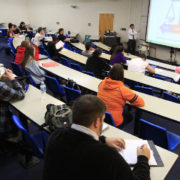All of us – from welders down to educators – will make discoveries about our own lives, and the better our education equips us to do so, the better we will live.
Seats of learning, especially colleges and universities, have been questioned since their inception. Arthur Quiller-Couch, known as Q, describes the critic’s words as saying that college education: “… is ‘useless;’ that it deals with history, dead languages, etc., that it ‘doesn’t pay’; …” and that “many of the most learned professors do not fill their lecture halls.” Criticism, Quiller-Couch continues,”… assumes the value of learning to correspond with its immediate market price.”

Arthur Quiller-Crouch
In his 1935 essay, The Scholarly Don, Quiller-Couch wrote the above words and more to defend “a love of learning.” Because of the recent attacks on our entire educational system, we could benefit from a close reading of his essay today, as all our seats of learning, even elementary grades, are being targeted for much the same reasons that Q observed almost one hundred years ago.
A few years ago, when I was teaching Beowulf to second-semester seniors in a Shenandoah County public school, one student asked in a respectful but challenging tone, “Mr. Barbee, I’m going to be a welder. What good is this stuff gonna’ do me?”
Indeed! I heard his question, a young boy sitting in my classroom wearing clothes soiled from his work as an apprentice welder, as an honest one. I explained to him and the other students that literature, such as Beowulf, offers lessons for living that they may come to rely on later in their lives. I pointed out that he, the future welder, and his classmates had plans for their lives. But their plans, like Beowulf’s, could change as they lived.
I tried to explain that while they would not encounter flying dragons that breathed fire, they would encounter obstacles of every type, and sometimes, like Beowulf, they would need help from a loyal friend, such as Wiglaf. I stressed how honesty, loyalty, and faith in something larger than oneself were virtues worthy of every life. I tried, but all these years later, I still remember the unconvinced looks. However, since he and his contemporaries are still under thirty, hope remains.
[beautifulquote align=”full” cite=””]Like Q, I believe that “A love of learning” does exist in the world. While some students seek only an educational path that leads to wealth, others learn because it brings joy to their lives or is a way to help others.[/beautifulquote]
In the Oxford Union, I once heard an American scholar explain to about 300 American high school students how their coming weeks in various Oxford colleges could, if they chose, change the paths of their lives. He told them how they could, if they wanted, discover the joy to be had from serious, scholarly learning, not the rushed grabbing of information. In convincing them that scholarship was more than a word, he was telling them what Noel Annan wrote years later: that by serious study, they could “produce out of the chaos of human experience some grain of order won by the intellect.” I doubt if any high school coach has ever given a better pre-game or half-time talk.
[beautifulquote align=”full” cite=””]Some critics of academic institutions question the value of various degrees, and I do not suggest that all fields of study are equal; in fact, some of them puzzle me as well. As a personal example, I have a graduate degree in the Teaching of Writing, but my friends in England question me about how one teaches writing.[/beautifulquote]
After all, in their educational system, students write examination answers while in America, we darken the bubbles of multiple-choice questions. Perhaps if our students wrote more, even just a one-page answer in a now forgotten Blue Book, we would not need to teach “how” to write. But be the value judgment of fields of study, I value mine and grant you yours, no matter the field.
The naysayers who rail against educational systems today, unlike those in Q’s day, do not ask subtle questions but directly attack them, especially around the question of salary. More than one art major has been asked, “But how will you make a living?” In today’s climate, many political leaders work to destroy any course of study that does not, in some magical way, promise a path to riches. So, studies in philosophy, history, languages, and other majors are being cut. However, in 1935, Q provided the answer for these uninformed critics. “I might ask if it paid Columbus to insist that the earth was round, or Galileo that it rotated, or Harvey that the blood circulates.”
Discoveries like those are made by few, but all of us – from welders down to educators – will make discoveries about our own lives, and the better our education equips us to do so, the better we will live.



